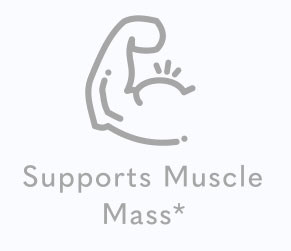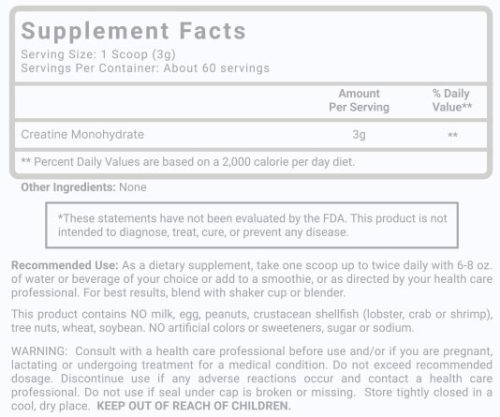Creatine
Creatine is among the most well-researched and effective supplements. It can help with exercise performance by rapidly producing energy during intense activity. Creatine may also provide cognitive benefits, but more research is needed in that area.
Why is suddenly CREATINE the big trend?
Examine resources:
Creatine is a molecule that is produced in the body from amino acids. It’s primarily made in the liver and (to a lesser extent) in the kidneys and pancreas.[1][2] Creatine stores high-energy phosphate groups in the form of phosphocreatine. These phosphate groups are donated to ADP to regenerate it to ATP, the primary energy carrier in the body.[3] This role in energy production is particularly relevant under conditions of high energy demand, such as intense physical or mental activity.
Creatine can be found in some animal-based foods and is most prevalent in meat and fish.[4][5] Athletes commonly take it as a powder or in capsules.
What are creatine’s main benefits?
- The primary benefit of creatine is an improvement in strength and power output during resistance exercise.
- Creatine is well researched for this purpose, and the effects are quite notable for a supplement.
- When used in conjunction with resistance exercise, creatine may modestly increase lean mass.
- It has also been tested for effects on anaerobic running capacity in many studies, the results of which are rather mixed but generally suggest a small improvement in performance.
Although creatine has been researched far less for cognitive performance than physical performance, it may have benefits in some contexts.
- Creatine appears to reduce mental fatigue in scenarios such as demanding mental activity and sleep deprivation.[6][7]
- Creatine may also improve working memory, though likely only for people with below-average creatine levels, such as vegetarians and older adults.[8][9]
- More research is needed in these areas and on other cognitive measures before creatine can be said to be effective.
There are many different forms of creatine available on the market, but creatine monohydrate is the cheapest and most effective. Another option is micronized creatine monohydrate, which dissolves in water more easily and can be more practical.Creatine monohydrate can be supplemented through a loading protocol (if needed?)
- To start loading, take 0.3 grams per kilogram of bodyweight per day for 5–7 days, then follow with at least 0.03 g/kg/day either for three weeks (if cycling) or indefinitely (without additional loading phases).
- For a 180 lb (82 kg) person, this translates to 25 g/day during the loading phase and 2.5 g/day afterward, although many users take 5 g/day due to the low price of creatine and the possibility of experiencing increased benefits.
- Higher doses (up to 10 g/day) may be beneficial for people with a high amount of muscle mass and high activity levels or for those who are non-responders to the lower 5 g/day dose.
Stomach cramping can occur when creatine is supplemented without sufficient water. Diarrhea and nausea can occur when too much creatine is supplemented at once, in which case doses should be spread out over the day and taken with meals.
What is the best form of creatine?
Although several forms of creatine have been investigated, there is no indication that there is a best form. With that said, it’s important to highlight that creatine monohydrate has the most evidence behind it to support its efficacy.
https://examine.com/supplements/creatine/
Is Creatine an Amino Acid?
No… “creatine is not an amino acid, protein, or gram.
- Creatine is a nitrogenous organic acid that is naturally produced in the body from amino acids such as arginine, glycine, and methionine.
- While creatine is often associated with protein supplements, it is not a protein itself, nor does it contain any amino acids.
- Creatine is typically measured in grams, as it is usually taken in supplement form as creatine monohydrate powder or capsules.
- However, it should be noted that creatine supplements are not a source of protein or amino acids.”
Does creatine benefit athletes?
Novice vs. Elite?
When it comes to studies conducted on whether or not a supplement can provide a benefit to sports and exercise, the first batch of studies is almost always done on untrained or lightly trained people. There is a reason for this, and that is because this group of people are going to get benefits anyways when they start to exercise and any interaction of the supplement is going to be more prominent to the researchers. It is only later that researchers look into elite athletes since, not only are they more uncommon, but tend to be more resistant to dietary supplements benefitting performance.
It is not uncommon for a supplement to benefit the novice but fail in the elite; does creatine, the king of ergogenics, fall into this category?
Creatine supplementation has indeed shown benefit in athletes considered to be on an elite level and has been shown to do so in; soccer,[1][2] volleyball,[3] wrestling,[4] swimming,[5] and more.
There are a few times where creatine supplementation does not benefit elites however, usually on measurements that aren’t related to bursts of power.
Finally, it does seem that the magnitude of benefit is lessened a bit with studies in elite athletes noting minor anti-fatigue effects and increases in strength which is in contrast to supplementation promoting large strength gains in the novice athlete.
https://examine.com/supplements/creatine/faq/plq77Q6-does-creatine-benefit-elite-athletes/
Why does Cynthia Thurlow suggest Creatine?
Save with our code LOWCARBATHLETE on https://cynthiathurlow.com/new-shop/creatine-order/
2. Brain Health
Questions that will be answered within this video with Thomas DeLauer:
- What is creatine?
- What does creatine do?
- What are the benefits of supplementing with creatine?
- How can creatine help workout performance and muscle growth?
- How much creatine should you take?
- Most of creatine is stored in muscle and fast twitch muscle
What does Dr. Stacy Sims say on Creatine for female athletes vs. male athletes?
Creatine for Strength and Performance
Creatine is a naturally occurring substance found in your muscle cells that helps them produce energy during high-intensity exercise and heavy lifting.
Your body stashes creatine in your muscles in a form called creatine phosphate or phosphocreatine (PCr).
When you need to generate extra force like for that deadlift PR or high-intensity sprint, your body separates the phosphate molecule from the rest of the compound, which it uses to create a muscle-powering energy molecule known as adenosine triphosphate (ATP).
Research shows creatine supplementation is most effective for those high-intensity, short-duration, or repeated bouts of high-intensity exercise with short rest periods like hill repeats, resistance training, and plyometric work.
Phosphocreatine also buffers the hydrogen ions that accumulate during high-intensity exercise, which cause your muscles to burn and fatigue, so it may delay that point where you feel like you have to dial it back. Having ample intramuscular stores means you can train more intensely and enjoy greater strength, power, and speed gains from your workouts.
For females, supplementing may be the best way to ensure those creatine stores are well stockpiled. Ninety-five percent of all creatine is stored in your skeletal muscles, and you can bump up those creatine reserves by about 20 percent with supplementation.
Women naturally have 70 to 80 percent lower creatine stores than men and we typically consume significantly lower amounts of dietary creatine, which comes primarily from animal foods like beef, compared to men.
A 2021 review of the literature published in Nutrients reported that “creatine supplementation may be of particular importance during menses, pregnancy, post-partum, during and post-menopause” (which is essentially a woman’s whole life!) and that “females with varying levels of training and fitness may experience improvements in both anaerobic and aerobic exercise performance from both short-term and long-term creatine supplementation.”
Another study published in the Strength and Conditioning Journal found that females had greater relative performance improvements over males, with males experiencing about a 6 percent increase in performance and females enjoying a 15 percent increase in performance—more than double the benefit.
Creatine for Brain Benefits
That 2021 study published in Nutrients also reported that creatine might have positive effects on mood and cognition and maybe even more effective for females by supporting brain health, and is especially useful for menopausal women who are more susceptible to increased inflammation.
The review also included depression research, indicating that women with a major depressive disorder who augmented their daily antidepressant with 5g of creatine responded twice as fast and experienced remission of depression at twice the rate of women who just took the antidepressant.
It can also be helpful for mood swings during the menstrual cycle. With the increase of estrogen and progesterone in the luteal phase, your body needs more creatine to help with hormone-mediated neurotransmitter changes, which affect your mood. Supplementing with creatine can help support those needs.
There is a position stand by the International Society of Sports Nutrition titled Safety and Efficacy of Creatine Supplementation in Exercise, Sport, and Medicine that is worth a look.
How to Supplement Creatine
Together, your liver, pancreas, and kidneys naturally produce about 1 gram of creatine per day. Your body uses about 2 grams a day. You have to make up the difference by either eating more animal proteins like red meat and seafood or getting it through supplementation with creatine, specifically creatine monohydrate, which is the most effective. Look for CreaPure, like in the Momentous creatine products, as it is tested for banned substances, is vegan, and is one of the most studied products on the market.
Creatine powder is tasteless, odorless, and not expensive. You can mix it in your smoothie, oatmeal, or recovery drink and won’t even notice it. Traditionally, athletes supplementing with creatine would go through a loading phase of taking ~20g/day for 6 days. This strategy has been associated with early stage water retention (the first 3 days), but lower doses (2-5g/day) over time do not show changes in total body mass, just shifts in fluid distribution.
https://www.drstacysims.com/blog/
Get Kion on Creatine.
What does the research say on CREATINE for athletes?
Nothing Beats Creatine for Boosting Athletic Performance. But It Isn’t Just for Bodybuilders.
Creatine is the most well-studied performance supplements, with thousands of studies backing up its benefits for muscle growth, athletic performance, and recovery*.
- Creatine works by supplying muscles with a quick source of energy, especially during short-burst, high-intensity exercise.
- When combined with resistance training, creatine supplementation has been shown to increase muscle strength and weightlifting performance [1].
- Creatine is commonly used by performance athletes for these benefits, but don’t be fooled; Its benefits far surpass gym gains.
- Because creatine is an essential nutrient, vegans, vegetarians and older adults can benefit from it, too.
- Plant-based eaters often miss out on creatine since most sources are found in animal products.
- Adding creatine to a plant-based diet has been shown to improve working memory and intelligence in vegans and vegetarians [2].
- Additionally, fatigue and muscle loss are unfortunate realities of aging that many older adults struggle with.
- Creatine has been shown to increase muscle mass and support fatigue resistance in older adults [3].
- Creatine is found in dietary animal sources, but often not at the levels needed to provide performance, muscular, and mental benefits (except perhaps you full-on Carnivores).
- Kion Creatine has your back. It’s 95% bioavailable and provides the recommended dose for taking your physical and mental performance to the next level.
- SAVE on Kion products with our code LOWCARBATHLETE at checkout!




